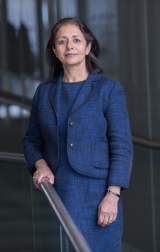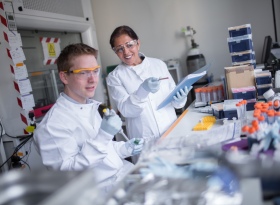Imperial's Safety Director talks about pushing boundaries and staying safe

Dr Surrinder Johal joined the College in July 2014 following 27 years working for international life sciences company LGC, latterly as Head of Safety.
Having competed a PhD in microbiology at Surrey University you’re no stranger to academia. What enticed you back?
During my time at LGC I actually had a whole host of very different roles, for example in business development and in areas like drugs of abuse and pharmaceutical proposals. LGC has worked with Imperial on a number of different research programmes, and so I knew of the reputation and diverse work of the institution. So in truth I wasn’t enticed into higher education per se; it was the pull of Imperial specifically. I simply would not have gone to any other higher education institution.
How do you enable researchers to push scientific  boundaries whilst remaining safe?
boundaries whilst remaining safe?
There is a widely held misconception that innovative science and safe practice are always pulling in opposite directions and they really needn’t be. Fundamentally, if you do things in a safe way, you usually do them in a planned, methodical way – and that’s exactly how good research should be done. I would never stop anyone pushing the boundaries; all I want to do is to be able to guide them through some of the safety implications.
But sometimes the unexpected happens at the frontiers?
Of course, and some of the best science comes out of things that haven’t gone quite as planned, but the question from a safety point of view is whether an adverse event or incident was reasonably foreseeable. If you’ve done a logical risk assessment of what the hazards might be and put in place controls, you cannot be held responsible for something unexpected happening. I remember CERN published a risk assessment on the likelihood that the Large Hadron Collider would create a black hole and swallow us all – it hasn’t happened yet!
 Do you believe in strict target setting in terms of the number of accidents and so on?
Do you believe in strict target setting in terms of the number of accidents and so on?
No. It’s absolutely the wrong way to go about doing things. If I said: “I want to see year-on-year reductions in accidents of 5% across the board,” I would probably get the results, but it would be because people would stop reporting incidents through fear of being judged. So it incentivises people to ‘go underground’ so to speak. And I don’t want that, in fact I want accidents and near misses reported so that we know what is really happening on the ground. A different example is when a lab manager tells me that they have a policy of no lone working after 8pm. For me, that is the wrong approach, because in this environment people will want to work at various times, when they are most productive and have a flow of ideas. We need to just accept that, and then address how to keep them safe. We don’t want to stop creativity.
How do you go about implementing a more open culture?
One of the things I would love to see is for safety to become an integral part of the research here, as opposed to it being seen as an add-on. I have met all the Heads of Department, most of whom are passionate about safety, and I am working at the moment with the safety representatives, who are leading the way with safety in their respective faculties. While we have a very comprehensive safety management system, it’s not user friendly so we need to make it a much easier, more efficient and simpler process. If the Safety Department is involved early enough in the research process, almost at a conceptual level when researchers are writing their grants, we could put in place many of the things they need to be safe and even get extra funding in some cases. Often we don’t get told about projects until later on.
In terms of hobbies do you play it safe or indulge in extreme sports and the like?
I think there’s enough risk at work with various category three pathogens, gas guns, lasers and the like! I enjoy movies and travelling – recently I’ve been to Bali, Spain, Hong Kong and India where I was born. I guess there’s always some risk in travelling!
Photographs by Thomas Angus
Article text (excluding photos or graphics) © Imperial College London.
Photos and graphics subject to third party copyright used with permission or © Imperial College London.
Reporter
Andrew Czyzewski
Communications Division